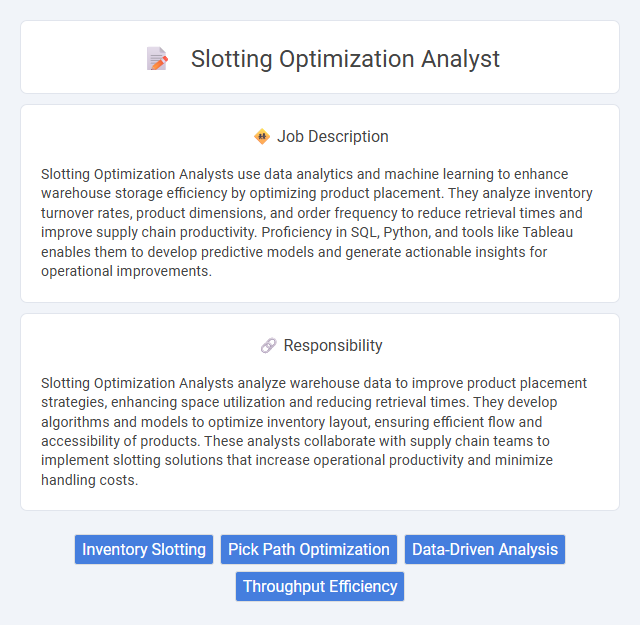
Slotting Optimization Analysts use data analytics and machine learning to enhance warehouse storage efficiency by optimizing product placement. They analyze inventory turnover rates, product dimensions, and order frequency to reduce retrieval times and improve supply chain productivity. Proficiency in SQL, Python, and tools like Tableau enables them to develop predictive models and generate actionable insights for operational improvements.
Individuals with strong analytical skills and attention to detail are likely to be well-suited for a Slotting Optimization Analyst role. Those who enjoy working with data, identifying patterns, and optimizing processes may find this job satisfying and engaging. Candidates who prefer repetitive tasks without critical thinking might struggle to meet the demands of this position effectively.
Qualification
Proficiency in data analysis tools such as SQL, Python, and Excel is essential for a Slotting Optimization Analyst to effectively interpret warehouse inventory and workflow data. Strong understanding of supply chain management principles and experience with warehouse management systems (WMS) enables optimizing product placement for improved operational efficiency. Candidates typically require a bachelor's degree in logistics, operations research, or industrial engineering, complemented by analytical problem-solving skills and attention to detail.
Responsibility
Slotting Optimization Analysts analyze warehouse data to improve product placement strategies, enhancing space utilization and reducing retrieval times. They develop algorithms and models to optimize inventory layout, ensuring efficient flow and accessibility of products. These analysts collaborate with supply chain teams to implement slotting solutions that increase operational productivity and minimize handling costs.
Benefit
A Slotting Optimization Analyst likely enhances warehouse efficiency by strategically organizing inventory to minimize travel time and reduce labor costs. This role probably improves order fulfillment speed and accuracy, contributing to higher customer satisfaction. Optimizing slotting arrangements may also lead to better space utilization, potentially increasing overall operational productivity.
Challenge
Slotting Optimization Analysts likely encounter challenges related to managing complex data sets to determine the most efficient product placements in warehouses or retail spaces. The role probably requires balancing competing priorities such as space limitations, product demand variability, and logistical constraints. Success depends on accurately interpreting data trends to optimize slotting strategies that improve inventory turnover and reduce operational costs.
Career Advancement
Slotting Optimization Analysts leverage data analytics and warehouse management systems to enhance product placement efficiency, significantly reducing picking time and operational costs. Mastery of advanced optimization software and logistics principles opens pathways to senior roles such as Supply Chain Manager or Logistics Director. Continuous skill development in machine learning and big data analytics further accelerates career growth in this competitive field.
Key Terms
Inventory Slotting
Inventory Slotting Optimization Analysts analyze product placement in warehouses to maximize space utilization and improve picking efficiency. By leveraging data analytics and warehouse management systems, they develop strategies to organize inventory based on demand patterns, product dimensions, and handling requirements. Their role directly enhances operational productivity and reduces fulfillment time in supply chain logistics.
Pick Path Optimization
A Slotting Optimization Analyst specializing in Pick Path Optimization leverages advanced algorithms and warehouse management systems to streamline product placement, reducing travel time and increasing picker efficiency. They analyze order patterns and SKU characteristics to create optimal slotting configurations, directly impacting labor costs and throughput rates. Expertise in data analytics and warehouse layout design is essential to enhance supply chain performance through precise pick path optimization.
Data-Driven Analysis
Slotting Optimization Analyst leverages data-driven analysis to enhance warehouse storage efficiency and improve inventory accuracy. Utilizing advanced statistical models and machine learning algorithms, the analyst identifies optimal product placement strategies that reduce picking time and increase throughput. This role requires proficiency in data visualization tools and warehouse management systems to translate complex datasets into actionable insights for operational improvements.
Throughput Efficiency
Slotting Optimization Analysts enhance warehouse throughput efficiency by analyzing product demand patterns and strategically assigning storage locations. Utilizing advanced algorithms, they minimize travel time and streamline picking processes, directly increasing order fulfillment rates. Their data-driven approach reduces bottlenecks and optimizes space utilization, leading to sustained operational excellence.
 kuljobs.com
kuljobs.com